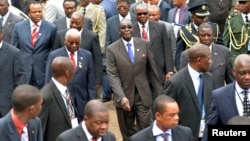JOHANNESBURG —
Zimbabwe has given the Southern African Development Community a lot of headaches in recent years. After the violent and disputed elections of 2008, the 15-nation bloc had to pressure President Robert Mugabe and opposition leader Morgan Tsvangirai to form a power-sharing government.
This year, SADC helped shepherd the fractious southern African nation toward July 31 elections. The vote was largely peaceful, but not free of problems: the opposition Movement for Democratic Change (MDC) has said the poll was rigged, and Zimbabwe Election Support Network, the nation’s largest observer mission, has cited problems with the voters’ roll, voter intimidation and reports of ballot-tampering.
At the SADC's upcoming summit, Zimbabwe is again expected to dominate the agenda.
While the regional bloc's own observer mission certified the poll as free and peaceful in an initial report, even Zimbabwe's official electoral commission has since acknowledged problems. On Thursday, SADC officials said nearly 305,000 voters were turned away from the polls, and that the bulk of them — nearly 65,000 voters — were in the capital, Harare, an opposition stronghold.
In the final results, President Mugabe was re-elected with 61 percent of the vote and his ZANU-PF party won two-thirds of the seats in parliament. Tsvangirai has said his MDC party will challenge the results in court and boycott the country's next government.
South Africa, an SADC heavyweight, was quick to congratulate Mugabe on his victory, but government officials in neighboring Botswana are calling on SADC to investigate the election.
"Our position is that in the context of the SADC guidelines for electoral process — and indeed, bearing in mind the findings of the wider SADC electoral mission — that SADC itself should take up this issue," said Botswana information minister Jeff Ramsay. "We are proposing that an independent audit be undertaken so that there’s a way of assessing the situation — and, really, for lessons moving forward."
Tom Wheeler of the South African Institute of International Affairs doubts the SADC is likely to answer Botswana’s call.
"Botswana ... has always taken a different position on Zimbabwe," he said. "This is not the first time that they’ve been critical of what’s happening in Zimbabwe, and so it’s not out of character, but at the same time I think that neither will it ... influence SADC."
Wheeler added that he does not expect SADC to feel compelled to build a coalition government in Zimbabwe this time around.
"In 2008, the coalition government was put together because of the extent of violence and general mayhem, whereas I think ZANU-PF have learned this time to make sure that there isn’t such a thing to such an extent, and therefore the urgency for creating a government of national unity, or whatever you’d like to call it, isn’t there to the extent that it was in 2008," he said.
SADC ministers meet this weekend in Malawi's capital, Lilongwe, where heads of state will convene the SADC Summit of Heads of State and Governments on August 17 and 18.
This year, SADC helped shepherd the fractious southern African nation toward July 31 elections. The vote was largely peaceful, but not free of problems: the opposition Movement for Democratic Change (MDC) has said the poll was rigged, and Zimbabwe Election Support Network, the nation’s largest observer mission, has cited problems with the voters’ roll, voter intimidation and reports of ballot-tampering.
At the SADC's upcoming summit, Zimbabwe is again expected to dominate the agenda.
While the regional bloc's own observer mission certified the poll as free and peaceful in an initial report, even Zimbabwe's official electoral commission has since acknowledged problems. On Thursday, SADC officials said nearly 305,000 voters were turned away from the polls, and that the bulk of them — nearly 65,000 voters — were in the capital, Harare, an opposition stronghold.
In the final results, President Mugabe was re-elected with 61 percent of the vote and his ZANU-PF party won two-thirds of the seats in parliament. Tsvangirai has said his MDC party will challenge the results in court and boycott the country's next government.
South Africa, an SADC heavyweight, was quick to congratulate Mugabe on his victory, but government officials in neighboring Botswana are calling on SADC to investigate the election.
"Our position is that in the context of the SADC guidelines for electoral process — and indeed, bearing in mind the findings of the wider SADC electoral mission — that SADC itself should take up this issue," said Botswana information minister Jeff Ramsay. "We are proposing that an independent audit be undertaken so that there’s a way of assessing the situation — and, really, for lessons moving forward."
Tom Wheeler of the South African Institute of International Affairs doubts the SADC is likely to answer Botswana’s call.
"Botswana ... has always taken a different position on Zimbabwe," he said. "This is not the first time that they’ve been critical of what’s happening in Zimbabwe, and so it’s not out of character, but at the same time I think that neither will it ... influence SADC."
Wheeler added that he does not expect SADC to feel compelled to build a coalition government in Zimbabwe this time around.
"In 2008, the coalition government was put together because of the extent of violence and general mayhem, whereas I think ZANU-PF have learned this time to make sure that there isn’t such a thing to such an extent, and therefore the urgency for creating a government of national unity, or whatever you’d like to call it, isn’t there to the extent that it was in 2008," he said.
SADC ministers meet this weekend in Malawi's capital, Lilongwe, where heads of state will convene the SADC Summit of Heads of State and Governments on August 17 and 18.











